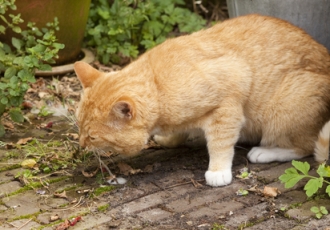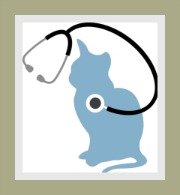About Feline Vomiting
the
Causes and Symptoms
Feline vomiting or cat vomiting is not an illness as such, but rather a sign or symptom of an underlying disease.
Having said this, it's important for cat owners not to confuse regurgitation with actual vomiting.
Vomiting is a described as a reflex or involuntary muscular action whereby the contents of the cat's stomach or small intestine are forcibly expelled from the mouth.
Regurgitation on the other hand is a more relaxed or passive action where food or hairballs are passed quite sluggishly from the mouth.
Healthy cats do occasionally vomit and this may be normal.
Cats with severe or persistent vomiting accompanied by diarrhea, abdominal pain, or a cat vomiting blood, bile or phlegm needs veterinary attention.
A cat that continuously regurgitates its food also needs to be examined by a vet as this may indicate a constriction, obstruction or disease of the esophagus (i.e. gullet).
symptoms of feline vomiting
It is generally accepted that there are three phases in the symptoms of cat vomiting:
- Initially your cat may look a little distressed, swallow repeatedly and also lick its lips continually. This is a sign of nausea or queasiness.
- In the second phase your cat will demonstrate heavy or forceful breathing and this is as a result of the stomach contracting. This phase is known as the retching or gagging stage.
- Finally, as the abdominal wall muscles and the diaphragm contract, it causes a heaving action and the contents of the stomach are then forced up the esophagus and out of your cat's mouth. This is known as cat vomiting.
cat vomiting

why is my cat vomiting?
Vomiting in cats can be caused by or associated with a wide range of underlying disorders.
We have compiled a list of the possible causes of cat vomiting.
We always recommend that you consult with your veterinarian if your cat has severe, uncontrolled vomiting. Diagnosis is always best left to the experts.
the causes
- One of the most common reasons of feline vomiting is a sudden change in your cat's regular diet.
- If your cat ingests food that is spoiled i.e. food that is 'off' or rotten. (This is not a common occurrence in cats as they are finicky about what they eat)
- Food allergies or hypersensitivity to a particular cat food.
- Poisoning - either deliberate or accidental. Cats that are allowed to roam the neighborhood may be at risk of been poisoned. (Cats vomit to rid or protect themselves from harmful substances).
- Cats are sensitive creatures and can respond negatively to a change in their environment. Stress, fear or nervousness can result in sudden vomiting.
- Middle ear disease which causes damage to the cat's sense of balance or travel /motion sickness can also result in nausea and vomiting.
- Infectious feline diseases like feline distemper (i.e. parvo virus or feline Panleucopenia) and other viral and bacterial infections in cats may also cause diarrhea and vomiting.
- Intestinal worms i.e. internal parasitic worms are a common cause of feline vomiting.
- Cats with systemic diseases like diabetes mellitus (sugar diabetes), hyperthyroidism, liver and kidney disease often present with vomiting.
- Inflammatory diseases of the bowel (large and small intestines) and the stomach (gastritis) may cause vomiting and diarrhea.
- Severe trauma to the head can also result in vomiting.
- Feline vomiting may also be caused by obstruction of the intestinal tract due to tumors (cancerous or benign).
- In kittens, due to their inquisitive behavior, intestinal obstruction can occur due to the ingestion of foreign objects like string, cotton or even buttons. In older cats, obstruction may be due to hairball.
- A cat vomiting phlegm or a white foam could be a sign of respiratory disease.
- A cat vomiting bile or yellow or green-colored vomit may be a sign of a twisted bowel or intussusception (when part of the bowel telescopes or slides into the next). Your kitty will also have a lack of appetite, tender abdomen and be listless.
- A cat vomiting blood may have an obstruction or an intestinal or gastric bleed due to trauma or a tumor.
- A cat vomiting after anesthesia or after surgery is quite common. If the vomiting persists, seek veterinary advice immediately.
- Kittens that present with projectile vomiting shortly after been weaned may indicate that your kitten has pyloric stenosis (i.e. a constriction of the opening between the stomach and small intestine).
As there are so many reasons why your cat may be vomiting, it is important to get and accurate diagnosis and appropriate treatment.
For the diagnosis and treatment of cat vomiting we recommend visiting this chapter.
Related Cat Pages:
Top of Feline Vomiting Page
Return to Cat Diseases
search our site
please like us
share our site
recommend on google
favorite pages










